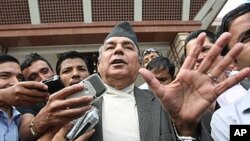Political uncertainty is intensifying in Nepal, where in the last three months, a dozen attempts to form a new government have failed. The political impasse threatens to unravel a peace process that saw the Himalayan country make a transition to a democracy.
People are gearing up to celebrate the country's main festival, Dashain. The persisting political deadlock, however, has cast a dampener on the festive mood.
Parliament has held a record 12 elections to choose a new leader since Prime Minister Madhav Kumar Nepal resigned on June 30. They all have failed to produce a winner because of a lack of consensus among the three main political parties - none of which have a parliamentary majority.
Lack of consensus
One of the two candidates initially contesting for the prime minister's post, Maoist leader Prachanda, has quit the race. Even the lone candidate now in the fray, Ram Chandra Poudel of the Nepali Congress, has been unable to get the votes needed because the two other major parties are boycotting the vote.
Political analysts say that deep differences and infighting between the country's three main parties have created a political impasse which is becoming difficult to resolve.
Nepali Times Editor Kunda Dixit says this is partly because of deep suspicion of the Maoists, who unexpectedly won the most seats in parliament in 2008, when Nepal made the transition from a monarchy to a fragile democracy.
"It is the Maoists versus the rest, where one is deemed to be a completely undemocratic, totalitarian minded party, and the others consider themselves democrats," said Dixit.
Points of contention
The Nepali Congress and the Communist Party accuse the Maoists of failing to honor agreements made when they ended a 10-year insurgency and entered the political mainstream. One of the main disputes centers around the fate of about 19,000 former rebel fighters. Maoists want them integrated into the army, but the other parties are bickering about the terms of their integration. Other political parties are also demanding that the Maoists return property they seized during the insurgency.
The persisting political deadlock has triggered calls by many politicians for the creation of a power-sharing government. The speaker has ruled, though, that the process of choosing a new prime minister will continue as long as even one candidate continues to contest.
This has raised worries that the parliament may not be able to complete the final stage of the peace process, which is drafting a new constitution.
New constitution needed
Lok Raj Baral, at Nepal's Center for Contemporary Studies, said parliament already has missed the first deadline this year, which was in May. He said the new deadline is April - just six months away.
"We are much worried about the constitutional process, whether the constitution will be made within the stipulated time," said Baral. "That is a major concern of all people. We have not yet seen the way out."
The lack of a functioning government also is affecting the economy in one of the world's poorest countries. The Maoists have refused to let the caretaker government pass the annual budget. Development projects have been put on hold. Many government offices say they have little money left to spend. Kunda Dixit said this has raised serious concerns.
"After the holidays, government hospitals will not have medicines; teachers wont be paid; there will be no money left over for repairing roads, bridges and so forth - so the whole country is more or less going to grind to a halt," said Dixit.
Stalled progress
The United Nations has expressed concern that the country's peace process remains incomplete, four years after the peace agreement was first signed.
Sarah Levitt Shore is the country representative at the American-based non-governmental group Carter Center in Nepal. She said they have found a high level of disillusionment with the political process among people.
"People are disappointed that the process is not moving forward faster," said Shore. "And they are really hoping and expecting that their leaders can make a breakthrough in the near future and deliver some concrete peace deliverables to them."
Whether Nepal's political parties can overcome their differences and salvage the peace process will only be known when parliament meets next to choose a new leader on October 26th, after the festival season ends.




